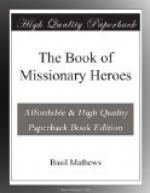For Urumia city lies to the west of the southern end of the extremely salt lake of the same name. It is about 150 miles west from the Caspian Sea and the same distance north of the site of ancient Nineveh. It stands on a small plain and in that tangle of lakes, mountains and valley-plains where the ambitions of Russia, Persia and Turkey have met, and where the Assyrians (Christians of one of the most ancient churches in the world, which in the early centuries had a chain of missions from Constantinople right across Asia to Peking), the Kurds (wild, fierce Moslems), the Persians, the Turks and the Russians struggled together.
In front of Dr. William Ambrose Shedd there stood an old man from the villages. His long grey hair and beard and his wrinkled face were agitated as he told the American his story. The old man’s dress was covered with patches—an eyewitness counted thirty-seven patches—all of different colours on one side of his cloak and loose baggy trousers.
“My field in my village I cannot plough,” he said, “for we have no ox. The Kurds have taken our possessions, you are our father. Grant us an ox to plough and draw for us.”
Dr. Shedd saw that the old man spoke truth; he scribbled a few words on a slip of paper and the old man went out satisfied.
So for hour after hour, men and women from all the country round came to this strange missionary who had been asked by the American Government to administer relief, yes, and to be the Consul representing America itself in that great territory.
They came to him from the villages where, around the fire in the Khans at night, men still tell stories of him as one of the great hero-leaders of their race. These are the kind of stories that they tell of the courage and the gentleness of this man who—while he was a fine American scholar—yet knew the very heart of the Eastern peoples in northwestern Persia as no American has ever done in all our history.
“One day,” says one old village Assyrian greybeard, “Dr. Shedd was sitting at meat in his house when his servant, Meshadi, ran into the room crying, ’The Kurds have been among our people. They have taken three girls, three Christian girls, and are carrying them off. They have just passed the gate.’ The Kurds were all bristling with daggers and pistols. Dr. Shedd simply picked up the cane that he holds in his hand when he walks. He hurried out of the house with Meshadi, ran up the hill to the Kurd village that lies there, entered, said to the fierce Kurds, ‘Give back those girls to us.’ And they, as they looked into his face, could not resist him though they were armed and he was not. So they gave the Assyrian girls back to him and he led them down the hill to their homes.”
So he also stood single-handed between Turks and five hundred Assyrians who had taken refuge in the missionary compound, and stopped the Turks from massacring the Christians.
But even as he worked in this way the tide of the great war flowed towards Urumia. The people there were mostly Assyrians with some Armenians; they were Christians. They looked southward across the mountains to the British Army there in Mesopotamia for aid.




